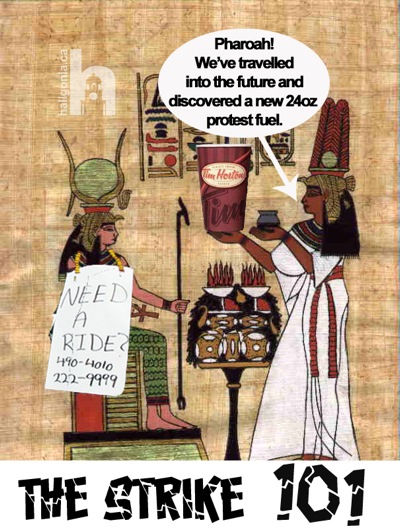
By Ameeta Vohra and Ashley King. Metro Transit bus drivers are striking. Dalhousie faculty is set to vote on strike action and the Chronicle Herald awaits it's union members agreement to avoid strike action. If you mix in the collective bargaining talks in the health districts, there is a lot of strike action going on. Haligonia then asks, how much do you know about the history of striking? Well, it's time to get an education of the origination of the strike movement. During this week we present to you a crash course on the History of Striking.
The early origins of a strike movement started in ancient Egypt in 1152 BC. It was organized by the artisans of Royal Necropolis at Deir el Medina. Egypt was under rule by Pharaoh Ramses III at the time. Egyptian's hierarchy didn't know what to expect with a strike, so it instilled enough fear in them to cave in to the protesters demands and increase their wages.
Without doubt there have been instances of some groups of people refusing to work for someone or some other group of people until they were treated better. This may be said to be, therefore, the beginning of the known history of labour strikes and collective bargaining.
'We are hungry: eighteen days have elapsed in the month.' This is the message workers at the royal necropolis, handed over by the scribe Amennakht1 to the administration of Medinet Habu.
In the year 1158 or 1157 BC, the country found itself in conditions of financial hardship due to a few reasons After wars against Libya and a confederacy of seafaring raiders 'The Sea People'. An inefficient and corrupt government . Loads of money was also being spent on construction of a gigantic tombs in the Valley of the Kings. A massive eruption of the volcano Hekla in Iceland had thrown the place into darkness, which inhibited plant growth for about 20 years.
An initial strike was averted on the 21st day of the second month of the 29th year of the reign of Ramses III. But In the sixth month of the same year, the workers again found themselves without pay or provisions. Workers repeated the nature of their grievances. Hunger, thirst, no clothing, no ointment, no fish, no vegetables. After workers repeated their action within a different temple. the following day, priests finally recorded the complaints of the workers and sent to Thebes for the required food and supplies.



